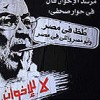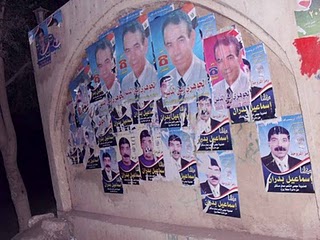With the Egyptian parliamentary elections around the corner, candidates, as well as their parties, are using all the ethical and non-ethical weapons in order to win. And Egyptian bloggers, on the other hand, are watching, reporting, and sometimes participating in the ongoing war.
Sunday's (November 28) elections will see about 800 candidates from the ruling National Democratic Party (NDP), 250 from the liberal Al Wafd Party and 130 from the Muslim Brotherhood vying for the parliament's 508 seats.
The Three Main Parties
The Arabist wrote here about the an NDP candidate's campaign in Alexandria, and how – according to his point of view – the candidate's opponent, who is a member of the Muslim Brotherhood, is being oppressed.
Zeinobia also wrote here about an almost identical incident in another city in Egypt. The post also included some videos showing what happened there in her post.
In the previous elections, the NDP chose 444 of its members to compete for the available 444 seats in parliament. The NDP members who weren't chosen to run on behalf of the party decided to enter the election as independent candidates. Later on, when the NDP won 38 per cent of the available seats, those independent members rejoined the party – giving it the majority of the parliamentary seats. Voice of Egypt reminded his readers about this, saying how it proves that the NDP is a party with no ideology nor fixed policy. He also explained how the party decided to tackle this issue this year:
Another blogger, Hassan El Helaly, decided to publish some posters on his blog, in order to show his readers how voting for the Muslim Brotherhood candidates is a bad decision. The posters highlight what he called the black history of the MB.

The poster shows the former MB head, quoting him saying he doesn't care about Egypt nor those living inside it.
Another Egyptian party that is participating in the elections is the New Wafd Party. Wafd is usually taken with a grain of salt by the Egyptian bloggers and they accuse it to be a puppet party following the ruling NDP's hidden agenda. Zeinobia wrote here about the Wafd's announcement for the Egypt’s first ever shadow cabinet, which she described as a “media stunt.”
She then commented on the party's advertisement.
Monitoring the Election
Many observers, both inside and outside Egypt, called for international election monitors, especially that U.S. officials and international organizations said that there was credible evidence of voter fraud and intimidation during polls for the country's Shura (Consultative) Council elections in June. Zeinobia wrote here how the Egyptian regime refused to allow international monitors, claiming it was against the country's sovereignty.
I do not understand what brings international poll monitors to the sovereignty talk!!??
Zeinobia then wondered why the United States did not consider the presence of international monitors during its presidential elections to be against its sovereignty.
The High Elections commission created an official website for the parliamentary elections, and the absence of international monitors forced activists in Egypt to create Ushahidi-based applications in order to monitor the elections. Zeinobia listed all the independent monitoring applications here.
Other Comments on the Elections
Many other bloggers have their own comments on the elections. Tarek claims that the reason why Egyptian elections have a low voter turn out is because the polls take place on a working day [Ar], and there are no official rules for business owners to let their employees to go to polling stations. Abul Maaly Fayek commented on the election posters the candidates stick on walls everywhere without even taking the house owners permissions [Ar]. He urged people not to vote for those members who bombard buildings with their posters without prior permission. And finally, Saeed Omar published an old video that – according to his point of view – summarizes how elections work in Egypt.








1 comment